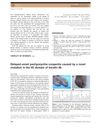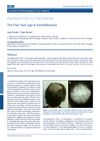 24 citations,
August 2020 in “AJGP”
24 citations,
August 2020 in “AJGP” A woman's sudden hair loss was linked to her previous COVID-19 infection.
 7 citations,
October 2017 in “Behavioural Pharmacology”
7 citations,
October 2017 in “Behavioural Pharmacology” Fluoxetine's effectiveness as an antidepressant in mice depends on a specific protein activity and a 5-minute pretest.
[object Object]  2 citations,
July 1996 in “Annals of Internal Medicine”
2 citations,
July 1996 in “Annals of Internal Medicine” Taking fluconazole for fungal infections might cause hair loss after about 3 months.
 1 citations,
October 2021 in “PubMed”
1 citations,
October 2021 in “PubMed” A woman had temporary hair loss after scalp surgery, which is a rare but self-healing condition that surgeons should recognize to avoid wrong treatment.
 January 2022 in “Clinical dermatology open access journal”
January 2022 in “Clinical dermatology open access journal” Early-stage Alopecia Areata was effectively treated in less than six months.
 April 2014 in “The FASEB Journal”
April 2014 in “The FASEB Journal” Geranium Sibiricum L extract may promote hair growth by increasing growth factors and decreasing inhibitory factors under stress.

Rapid weight loss can cause temporary hair loss, but hair usually grows back.
 47 citations,
May 2002 in “Journal of Cutaneous Medicine and Surgery”
47 citations,
May 2002 in “Journal of Cutaneous Medicine and Surgery” Pregnancy can cause normal skin changes that usually go away after childbirth and don't need treatment.
 11 citations,
January 2018 in “Annals of Dermatology”
11 citations,
January 2018 in “Annals of Dermatology” Some people experienced temporary hair loss after hair transplant surgery but recovered fully within 10 months.
 4 citations,
December 2013 in “The Journal of Dermatology”
4 citations,
December 2013 in “The Journal of Dermatology” A new mutation in the K6b gene caused a girl's late-appearing nail condition.
 1 citations,
October 2013 in “Our Dermatology Online”
1 citations,
October 2013 in “Our Dermatology Online” 5α reductase type 2 enzyme mutation and oxidative stress may increase androgenetic alopecia risk in Egyptians.
 1 citations,
October 2013 in “A & A case reports”
1 citations,
October 2013 in “A & A case reports” Hair loss from telogen effluvium may not happen again after another surgery.
 December 2022 in “Journal of complementary medicine & alternative healthcare”
December 2022 in “Journal of complementary medicine & alternative healthcare” Traditional Chinese medicine improved hair loss in a teenager with alopecia.
 61 citations,
September 2008 in “Biological & Pharmaceutical Bulletin”
61 citations,
September 2008 in “Biological & Pharmaceutical Bulletin” Finasteride almost fully depletes allopregnanolone in rat brains and enhances 20α-DHP, but doesn't change 3α-DHP levels.
 21 citations,
June 2017 in “Journal of Dermatological Treatment”
21 citations,
June 2017 in “Journal of Dermatological Treatment” Topical cetirizine improves hair density and thickness in androgenetic alopecia, but more research is needed.
 15 citations,
June 2019 in “Journal of Neuroendocrinology”
15 citations,
June 2019 in “Journal of Neuroendocrinology” Isoallopregnanolone may be a safe and effective treatment for reducing tics in a mouse model of Tourette syndrome.
 14 citations,
August 2019 in “Journal of Dermatological Treatment”
14 citations,
August 2019 in “Journal of Dermatological Treatment” 10% minoxidil solution better promotes hair growth and reduces hair loss without significant side effects.
 13 citations,
June 2012 in “Journal of Dermatological Case Reports”
13 citations,
June 2012 in “Journal of Dermatological Case Reports” An 8-year-old boy with hair-pulling disorder had a bald patch that was confirmed not to be a fungal infection and was treated with therapy.
 12 citations,
March 2016 in “BBA clinical”
12 citations,
March 2016 in “BBA clinical” Increased Toll-like receptors in blood cells may contribute to alopecia areata and could be a target for new treatments.
 10 citations,
January 2017 in “Skin Pharmacology and Physiology”
10 citations,
January 2017 in “Skin Pharmacology and Physiology” Finasteride may cause vitiligo, sexual issues, and depression; better treatments and predicting side effects needed.
[object Object]  6 citations,
September 2019 in “Archives of Dermatological Research”
6 citations,
September 2019 in “Archives of Dermatological Research” Found 32 genes linked to male baldness, affecting hair growth and stress-related pathways.
 6 citations,
April 2016 in “Journal of the Formosan Medical Association”
6 citations,
April 2016 in “Journal of the Formosan Medical Association” Metformin improved insulin resistance and BMI in overweight Taiwanese women with PCOS, and a 2-hour insulin test may be a good screening tool.
 6 citations,
November 2007 in “Archives of Disease in Childhood: Education & Practice”
6 citations,
November 2007 in “Archives of Disease in Childhood: Education & Practice” The document concludes that accurate diagnosis of alopecia in children relies on thorough examination and history, and while treatments exist, none can alter the course of alopecia areata, which can significantly affect a child's psychological well-being.
 5 citations,
May 2021 in “Veterinary medicine and science”
5 citations,
May 2021 in “Veterinary medicine and science” Injecting cosyntropin into grizzly bears increases blood cortisol but doesn't change hair cortisol levels.
 5 citations,
October 1984 in “The BMJ”
5 citations,
October 1984 in “The BMJ” Up to 50% of scalp hair can be lost before it appears thin, and treatment is only needed for hair loss caused by diseases or deficiencies.
 3 citations,
July 2018 in “Journal of Oral and Maxillofacial Surgery”
3 citations,
July 2018 in “Journal of Oral and Maxillofacial Surgery” Hair loss can occur after oral surgery, likely due to stress and pressure on the scalp, and usually gets better on its own.
 2 citations,
December 2021 in “Scientific reports”
2 citations,
December 2021 in “Scientific reports” Scalp hair sweating is a significant predictor of hair cortisol levels.
 2 citations,
January 2005 in “International Journal of Dermatology”
2 citations,
January 2005 in “International Journal of Dermatology” Mnemonics help improve memory in dermatology by up to 50%.
 1 citations,
May 2022 in “Archiv Euromedica”
1 citations,
May 2022 in “Archiv Euromedica” Topical treatment is recommended for Folliculitis decalvans in pregnant women.
 1 citations,
January 1997 in “Dermatology”
1 citations,
January 1997 in “Dermatology” A woman lost her hair from stress after a bee attack and her sister's death.






























